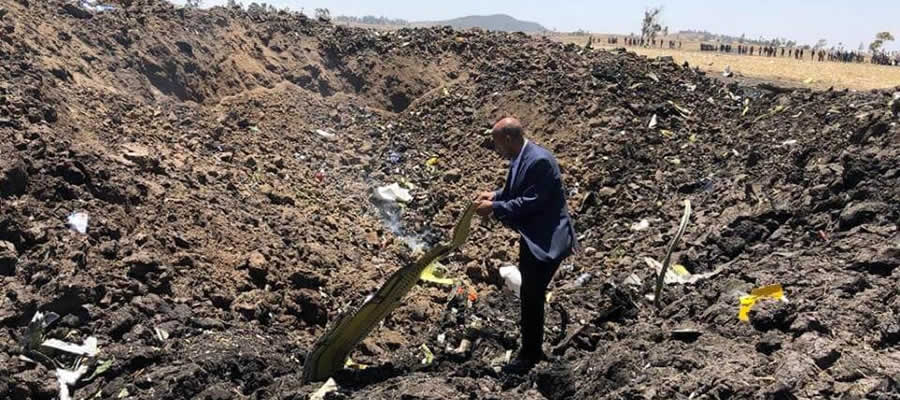Boeing has now grounded the 737 Max aircraft, bowing to presidential and regulatory pressure. The notice from the US Federal Aviation Administration (FAA) is enlightening since it has confirmed the similarities between the Ethiopian crash and the Lion Air (Flight JT610) crash of the aircraft type, which thus far has only been supposed by industry experts.
In the emergency airworthiness directive issued on March 13, the FAA said that it based its decision to ground the aircraft upon investigation of the new information concerning the wreckage and satellite-based tracking data of the flight path of ET302 that indicates some similarities with Flight JT610 that it says “warrants further investigation of the possibility of a shared cause for the two incidents that needs to be better understood and addressed”.
The FAA confirmed that the grounding will remain in effect “pending further investigation, including examination of information from the aircraft’s flight data recorders and cockpit voice recorders. An FAA team is in Ethiopia assisting the NTSB as parties to the investigation of the Flight 302 accident. The agency will continue to investigate.”
The satellite data was supplied by FlightAware and Aireon at the request of the FAA, the US National Transportation Safety Board (NTSB), Transport Canada and several other aviation authorities. Aireon provided the data transmitted from Flight 302, which was based on Aireon’s space-based Automatic Dependent Surveillance-Broadcast (ADS-B) system that has the ability to monitor data from all aircraft equipped with ADS-B transponders.
Boeing’s official response was that it supports the FAA action and it has determined “out of an abundance of caution and in order to reassure the flying public of the aircraft’s safety — to recommend to the FAA the temporary suspension of operations of the entire global fleet of 371 737 MAX aircraft”.
Dennis Muilenburg, president, CEO, Chairman of The Boeing Company, expressed his condolences on behalf of the entire Boeing team, to the families and loved ones of those who have lost their lives in the two tragic accidents.
“We are supporting this proactive step out of an abundance of caution,” he added. “Safety is a core value at Boeing for as long as we have been building airplanes; and it always will be. There is no greater priority for our company and our industry. We are doing everything we can to understand the cause of the accidents in partnership with the investigators, deploy safety enhancements and help ensure this does not happen again.”
Canada has also grounded 737 MAX, stating that the satellite data suggested similarities between the two accidents.
The airline response is building. Norwegian CEO Bjorn Kjos has reiterated again in a televised message that the bill for the disruption will be “sent to those who produced the aircraft”.
Garuda Indonesia’s chief executive, Ari Askhara, stated that the airline is “reconsidering its upcoming order of 20 Boeing 737 MAXs after the two Boeing crashes,” reports Reuters. The same report states that Lion Air has postponed all planned 737 MAX deliveries until at least the release of a final report into its crash last year but has not yet decided on any cancellations.
Further reports are circulating regarding complains from US pilots to the FAA noting that the Max 8 aircraft had on occasion forced the nose downwards.
The impact on Boeing has been severe, losing $26bn+ off its market capitalisation in the past few days. How it performs over the coming weeks will be a measure of its crisis handling and PR capabilities.
Cowen and Company analysis states that airlines are resilient and will be able to shift fleets around to compensate for the loss of this one aircraft type, and that even though this change comes ahead of the busy Easter season, they are expected to cope. The airlines most affected in the Americas are WestJet, Southwest Airlines and Air Canada. United and American are also impacted to a lesser degree.
In an analyst report, Fitch Ratings notes that the impact of the Boeing 737 MAX grounding could be a “concern throughout the aviation credit sector for much of 2019”. Adding that there are many scenarios that could play out over the rest of the year, the worst-case scenario could be “systemic issue with the aircraft leading to lengthy groundings, material delivery delays, significant order cancelations and negative public sentiment toward the MAX”. Such a scenario, Fitch warns, would “weaken the credit profiles of Boeing (A/Stable) and some of its suppliers and place significant pressure on some weaker airline issuers. The effect on aircraft-secured debt transactions would likely be mixed, with deals containing the MAX potentially coming under pressure, offset by higher valuations for alternate narrow-body models needed to replace the MAX”. Neither Cowen nor Fitch expect any material impact of the Max grounding on aircraft lessors.
For now Fitch maintains that Boeing’s credit profile is “not immediately affected by the two crashes because of the company’s substantial liquidity, financial flexibility, low leverage, market positions and revenue diversification”, adding that groundings and delivery delays would likely need to last “beyond several months for the company’s rating to be affected”. Critical junctures will be the results of the two crashes, legal liability and compensation for replacement capacity are all watch items alongside the reputational damage to the company. Boeing has weathered periods of stress before, notes the rating agency, but how it acts in the coming days, weeks and months will be scrutinised by politicians, regulators, rating agencies, the media and the general public.
The industry is predicting that Boeing will likely re-evaluate the planned increase of production rates on the 737 to 57 a month, both as a reputational response and the commercial need to devote resources to the software or any other required fix for the Max aircraft. Delays to Max deliveries will impact expansions plans for airlines that will need to start altering fleet plans to cover any gaps in network coverage, albeit without any firm resolution deadline to the current situation.

